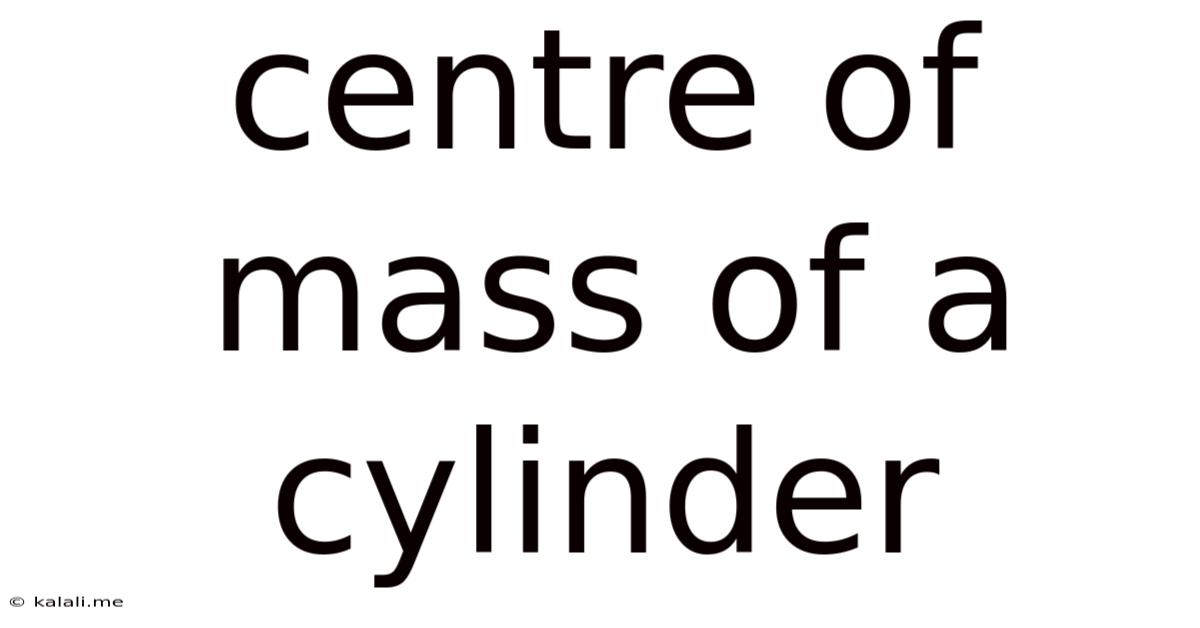Centre Of Mass Of A Cylinder
Kalali
Jun 10, 2025 · 3 min read

Table of Contents
Understanding the Center of Mass of a Cylinder: A Comprehensive Guide
Finding the center of mass of a three-dimensional object can seem daunting, but with a solid understanding of the principles involved, it becomes manageable. This article will guide you through calculating the center of mass of a cylinder, whether it's a solid cylinder or a hollow one. This is a crucial concept in physics and engineering, impacting everything from stability calculations to understanding rotational motion. We'll break down the process step-by-step, ensuring you grasp the underlying concepts.
What is the Center of Mass?
Before diving into cylinders, let's clarify the concept of the center of mass (also known as the center of gravity if the gravitational field is uniform). The center of mass is the point where the entire mass of an object can be considered concentrated. It's the average position of all the mass in the object. For symmetrical objects, it's often intuitively obvious. For irregular shapes, more complex calculations are required. Understanding this point is critical for analyzing an object's behavior under forces and torques.
Center of Mass of a Solid Cylinder
A solid cylinder possesses a high degree of symmetry. This symmetry simplifies the calculation of its center of mass. Because of its uniform density and symmetrical shape, the center of mass of a solid cylinder lies precisely at its geometrical center.
This means:
- Along the height (z-axis): The center of mass is located at exactly half the height of the cylinder.
- Along the radius (x and y-axis): Due to rotational symmetry, the center of mass is located at the center of the circular base.
Therefore, to find the coordinates of the center of mass (x<sub>cm</sub>, y<sub>cm</sub>, z<sub>cm</sub>) of a solid cylinder with height 'h' and radius 'r', we can simply state:
- x<sub>cm</sub> = 0
- y<sub>cm</sub> = 0
- z<sub>cm</sub> = h/2
This applies to a cylinder with a uniform density throughout.
Center of Mass of a Hollow Cylinder
The center of mass of a hollow cylinder, assuming uniform thickness and density of the cylindrical shell, is also located at its geometrical center. The calculations remain the same as for a solid cylinder:
- x<sub>cm</sub> = 0
- y<sub>cm</sub> = 0
- z<sub>cm</sub> = h/2
Factors Affecting Center of Mass
While the above calculations hold true for perfectly uniform cylinders, any deviation from uniformity will shift the center of mass. Consider these scenarios:
- Non-uniform density: If the cylinder has varying density across its length or radius, the center of mass will shift towards the region of higher density. More advanced integration techniques would be necessary to find the exact center of mass in such cases.
- Irregular shape: If the cylinder is not perfectly cylindrical (e.g., it's slightly bent or has an irregular base), its center of mass will deviate from the geometrical center.
Conclusion
Determining the center of mass of a cylinder is a fundamental concept in physics and engineering. For a uniform solid or hollow cylinder, the center of mass is straightforwardly located at the geometrical center. However, understanding how non-uniformity can influence the center of mass location is crucial for accurate analysis in more complex real-world scenarios. This knowledge forms the foundation for understanding an object's stability, rotational motion, and its response to external forces.
Latest Posts
Latest Posts
-
What Is 20 Of A Million Dollars
Jul 01, 2025
-
Harrison Garage Door Opener Hd 9700 User Manual
Jul 01, 2025
-
How Long Can Sour Cream Be Left Out
Jul 01, 2025
-
How Old Am I If I Was Born In 1986
Jul 01, 2025
-
How Many Ounces Is In 240 Ml
Jul 01, 2025
Related Post
Thank you for visiting our website which covers about Centre Of Mass Of A Cylinder . We hope the information provided has been useful to you. Feel free to contact us if you have any questions or need further assistance. See you next time and don't miss to bookmark.